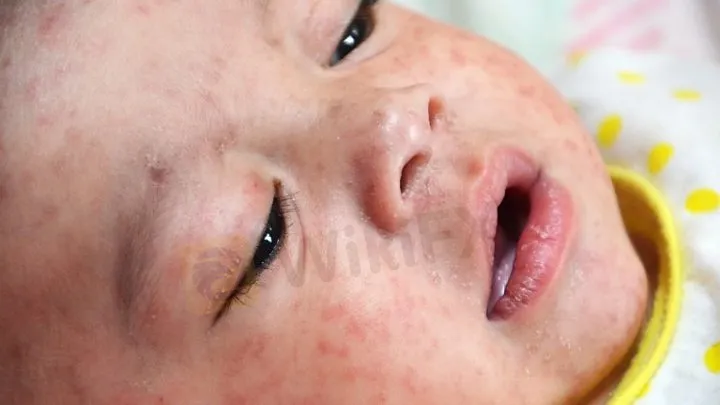简体中文
繁體中文
English
Pусский
日本語
ภาษาไทย
Tiếng Việt
Bahasa Indonesia
Español
हिन्दी
Filippiiniläinen
Français
Deutsch
Português
Türkçe
한국어
العربية
US teen who defied parents over vaccine warns of misinformation
Abstract:Image copyrightAFPImage caption The teenager's story was shared widely online in December 2018 A te
Image copyrightAFPImage captio
The teenager's story was shared widely online in December 2018
A teenager who made headlines for getting vaccinated despite his family's wishes has testified about his experience to US lawmakers.
Ethan Lindenberger, from Ohio, sought immunisations aged 18 after turning to the internet for advice.
Federal data suggests the proportion of US children under two not being immunised has quadrupled since 2001.
Doctors at the hearing blamed online misinformation and discredited science for scaring parents away from vaccines.
Mr Lindenberger, who is still a senior in high school, spoke on Tuesday at the Senate Committee on Health, Education, Labor and Pensions alongside four doctors who are experts in the field.
He said much of his mother's opposition to routine vaccines came from fear they could cause side-effects like brain damage or autism.
In 1998, a study by a British doctor Andrew Wakefield incorrectly linked the MMR (Measles, mumps and rubella) vaccine to autism. His research has since been completely discredited and Mr Wakefield has been struck off - but the theory has endured within the global anti-vaccination community.
Measles resurgence 'due to vaccine hesitancy'
'Don't be taken in by social media vaccine myths'
Russian trolls 'spreading vaccine misinformation'
All four doctors at Tuesday's hearing echoed that there was “absolutely no evidence” that exists which supports the link.
This is also affirmed in new Danish research released on Tuesday. The study examined 650,000 children over 10 years and categorically concludes that MMR does not increase the risk of autism or trigger it in those susceptible.
Mr Lindenbenger, doctors and members of Congress at the hearing all pointed out the internet fuels the spread of misinformation.
“My mother would turn to anti-vax groups online and social media rather than health officials and critical sources,” the teenager told the hearing.
He also pointed out his mother's decision had come from concern, not malice.
“There's a lot of emotional appeals talking about families, children and appealing to a parent's love, and manipulating that to convince them vaccines are dangerous,” he told the hearing about the nature of online posts.
That's the issue I take. I have tried to convey to my parents I don't think they are stupid for believing that, but people are very convincing and that's very dangerous."
Image copyrightAFPImage caption Some anti-vaccination advocates also attended the hearing
Mr Lindenberger's story went viral in late 2018 when he asked online forum Reddit about the subject.
At one point during Tuesday's hearing, Republican Senator Johnny Isakson joked that he would “love” to be a guest at the Linderberger family home for Thanksgiving dinner.
“Would be a heck of a discussion everybody would have,” he said about the family's public disagreement.
Health experts have long warned about the risk posed by parents who do not vaccinate.
They say the decision affects not only their families but everyone else because high vaccination rates are integral to keep communities protected.
This concept, which is known as herd immunity, offers protection for people like newborns and people with auto-immune diseases who are not able to be vaccinated.
The US has been battling a number of outbreaks of preventable diseases in recent years.
Senator Patty Murray, from Washington state, spoke at the hearing about a recent measles outbreak in her local Clark County where 70 cases have been confirmed.
Less than 80% of nursery-age children were immunised there in 2017 - well below the target rate of about 95% for herd immunity.

Media playback is unsupported on your device
Media captionThere have also been outbreaks of measles in Europe
At Tuesday's hearing, doctors implored the federal government to increase funding for vaccine education. They also asked state lawmakers to increase limits on non-medical vaccination exemptions for parents.
California is one state that has already cracked down on exemptions, following an outbreak of measles linked to Disneyland in 2015.
Similar outbreaks are not isolated to the US - there have been increases recorded elsewhere around the world.
In 2018, Europe saw three times more measles case than the year before.
The World Health Organisation (WHO) have blamed growing vaccine hesitancy for the outbreaks.
“Industrialised countries must not be complacent and forget that the disease can come back like a storm,” WHO's Dr Martin Friede told the BBC after the data was released.
Disclaimer:
The views in this article only represent the author's personal views, and do not constitute investment advice on this platform. This platform does not guarantee the accuracy, completeness and timeliness of the information in the article, and will not be liable for any loss caused by the use of or reliance on the information in the article.
WikiFX Broker
Latest News
Why Even the Highly Educated Fall Victim to Investment Scams?
Warning Against Globalmarketsbull & Cryptclubmarket
BSP Shuts Down Uno Forex Over Serious AML Violations
Rupee gains against Euro
ACY Securities Expands Global Footprint with South Africa Acquisition
Axi Bids AUD 52M to Acquire Low-Cost Broker SelfWealth, Outbidding Competitor Bell Financial
Crypto Influencer's Body Found Months After Kidnapping
Currency Calculator



